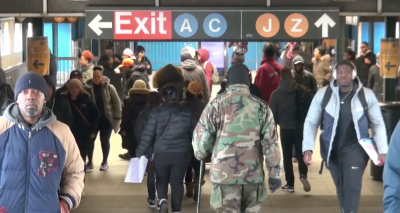TA: Traffic Justice Must Align With Racial Justice
With the incoming president running on a “law and order” message that includes promoting unconstitutional and ineffective stop-and-frisk practices on American city streets, civil rights groups associated with the Black Lives Matter movement are anticipating difficult fights ahead.
In a letter to their members yesterday, the leadership of Transportation Alternatives expressed commitment to the goals of the Black Lives Matter movement and laid out a set of guiding principles for integrating racial justice into their efforts to make NYC streets safe for walking and biking.
“Because we fight to protect New Yorkers in every community, our fight for Vision Zero must also be a fight against institutional, individual and implicit racism,” the letter says. “Transportation Alternatives stands in solidarity with the Black Lives Matter movement.”
The letter begins by noting striking racial imbalances: People of color are disproportionately likely to be harmed by traffic violence, while black drivers are also stopped, ticketed, and searched by police at five times the rate of white drivers, according to a 2015 New York Times report.
TA outlines five commitments:
- “Fight for unbiased automated enforcement” by promoting automated speed, red light, and failure-to-yield cameras that “do not risk ticketing based on race” and “do not unfairly target communities of color”;
- “Oppose discriminatory enforcement” that “melds” quality-of-life policing with traffic enforcement by calling on the NYPD to focus its traffic enforcement resources on the streets that are most dangerous for cyclist and pedestrians;
- “Fight for transportation justice and equity” by fighting for transportation investment in underserved communities;
- “Respect local knowledge and leadership” in how those investments are made;
- “Fight for restorative justice” by expanding a program at the Red Hook Community Justice Center that provides an alternative to incarcerations for people convicted of dangerous driving.
Speaking to Streetsblog this afternoon, TA Executive Director Paul Steely White said his team put together the letter and list of principles as a first step in integrating racial justice into the organization’s overarching strategy. “There was a realization that we as an organization have been slow to show up for racial justice,” he said. “It was overdue.”
TA staff who were involved in the Black Lives Matter movement in their personal time raised the importance of bringing racial justice concerns into their safe street advocacy. “I think they saw something that couldn’t be ignored by TA, especially when we’re calling for enforcement of Vision Zero,” White said. “When I [called for enforcement against reckless drivers], as a white activist, I think a lot of people of color heard something very different from what I thought I was saying.”



